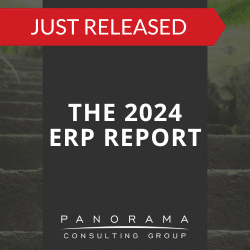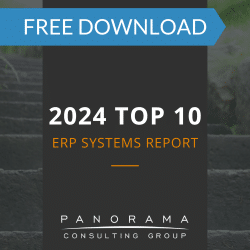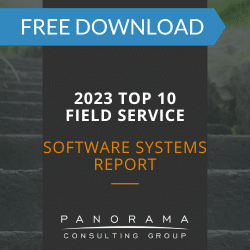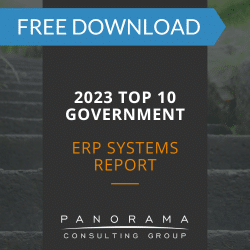There are only a few cases in which an organization would want to keep a collection of multiple enterprise resource planning (ERP) systems. We usually recommend consolidating your systems.
Do you have multiple ERP systems or legacy systems across your organization? Maybe you have a CRM system, SCM system, and HCM system, none of which are integrated.
Today, we’re discussing the pros and cons of this situation and sharing our ultimate recommendation, which is a single ERP strategy.
The Pros of Having Multiple ERP Systems
If your company uses multiple ERP systems in your daily operations, you may feel reluctant to make the change to a consolidated ERP system. While we recommend consolidating your ERP systems, a few potential benefits might keep you hanging on to your multiple systems:
1. Different Systems for Different Needs
Businesses often hang onto their multiple ERP systems because the systems help different departments conduct unique tasks. Your organization likely has departments that communicate differently or collect information not applicable to the entire business, so you may be eager to stick with your multiple ERP systems.
2024 Clash of the Titans
SAP, Oracle, Microsoft, and Infor each have a variety of systems that can support data-driven decision making. We surveyed customers of these four vendors to find out what their selection and implementation process was like.
2. Faster Mergers and Acquisitions
Your business might want to keep multiple ERP systems because you just merged with another company. You want to wrap up the M&A process without dithering over which company’s system will be the system of choice. The process of consolidating ERP solutions when you merge with another company might seem so overwhelming that multiple ERP systems sounds like a better plan.
The Cons of Having Multiple ERP Systems
Most businesses are better off if they choose to consolidate their systems into a singular platform. Below are some cons to having multiple ERP systems:
1. Multiple Systems Impact the User Experience
The first downside of having multiple ERP systems is that multiple systems can create a negative user experience. Multiple systems make it challenging for employees to find what they’re looking for, as the more systems you have, the less organized things tend to get. Wasting too much time looking for a single resource is frustrating and takes valuable time away from other tasks.
By consolidating your ERP systems, you give employees a single, user-friendly interface where they can get tasks done efficiently. Your employees will be more productive when they don’t have to look in numerous locations for a piece of information.
2. A Lack of Visibility Into Business Activities
It’s much more challenging to gain total visibility into all business-related tasks when you’re using multiple ERP systems.
A consolidated ERP system is essential to gain complete visibility into your work processes. By consolidating your systems, you can access information from all departments on a single platform, meaning you won’t be in the dark about any business operations.
3. Poor Customer Experience
The more ERP systems your business has, the worse your customer relationships become. Multiple ERP systems make it harder to access specific customer-related data, meaning that improving the customer experience is relatively impossible.
By consolidating your systems, you can more easily track essential customer information that helps you improve the overall customer experience. Without positive customer experiences, your business will struggle to form trusting relationships, ultimately negatively impacting your profitability.
4. Multiple Data Sources
Multiple ERP systems mean your business is more vulnerable to data inconsistencies that could harm the customer, employee, and organization. Additionally, multiple ERP systems make it challenging to analyze internal data across your organization. The more systems you have, the harder it is to integrate data for easy analysis.
By consolidating your ERP solutions, your organization stands a much better chance of keeping its data organized and integrated.
5. Higher Costs
Having multiple ERP systems means you’re paying maintenance and subscription costs for each system.
While you might worry about the upfront cost of consolidating your systems, your business will actually save significant sums of money in the long term.
6. Complicated Auditing
Regularly auditing your company’s finances and operations is essential to maintaining the integrity of your company and keeping promises to customers. However, having multiple ERP systems makes auditing far more complicated.
With a consolidated system, you can conduct audits in a single location instead of across multiple platforms.
What IT Strategy is Right for Your Company?
Consolidating your multiple ERP systems and point solutions may be the right choice for your company. Or, instead of integrating your systems, you may want to find a new ERP solution that has all these functions already built in.
Seeking an outside perspective can help you assess your needs and determine the best path forward, so be sure to contact our ERP implementation consultants below to request a free consultation.














